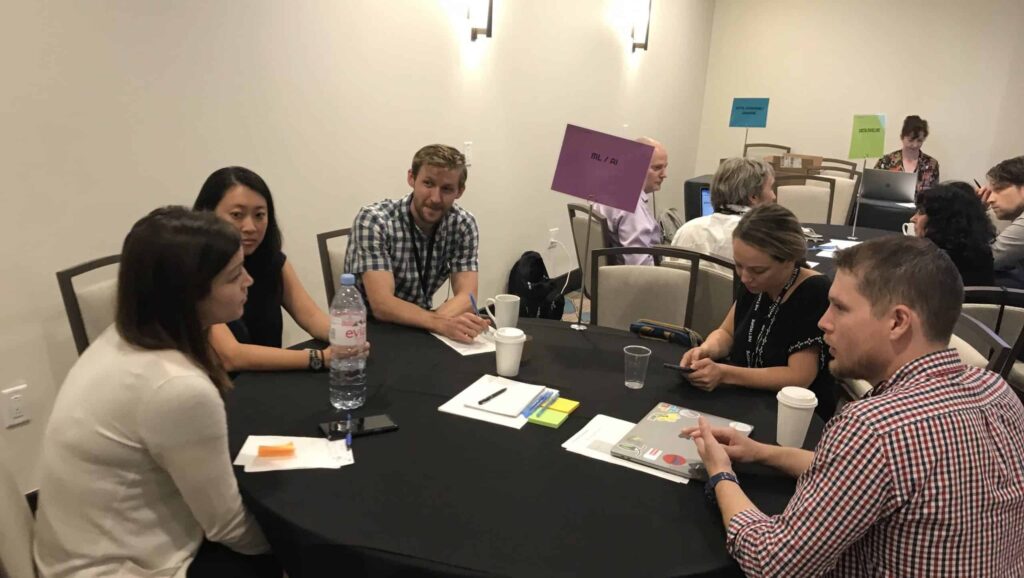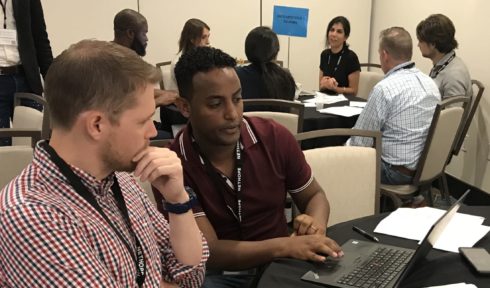Reflections on ‘Speed Data-ing’

Editor’s Note: This article originally appeared on the Cloudera Foundation website. In April 2021, the Cloudera Foundation merged with the Patrick J. McGovern Foundation.
by Hazem Mahmoud
Feb. 7, 2020

Some nonprofit organizations specialize in one or two stages along the data journey. At Cloudera Foundation, our core competency is the data journey. That’s why our foundation has a data technologist and a data solutions architect on staff dedicated to improving nonprofits’ capacity to utilize data for impact.
With this focus, we organized a unique workshop a few months ago at the NetHope Global Summit in San Juan, Puerto Rico. The summit annually convenes about 600 people from 60 of the world’s largest nonprofits and 60 leading technology companies. It’s a productive way to collaborate with innovators, visionaries and problem-solvers.
Our workshop, titled “Speed Data-ing: How to Use Data and Data Science for Impact” was an elaborate and mighty collaboration that included data experts from DataKind, AidData, Terre des hommes, and employee volunteers from Cloudera Inc. The session drew attendees from Mercy Corps, Americares, World Bank, Mercy Ships, Google.org and many others.
Here’s how it worked
DataKind, AidData and Terre des hommes kicked off the workshop with highlights of how they’re using data for good. Then came an impressive and relevant demo by Cloudera Inc.’s field engineers on using public data for hurricane response efforts in Puerto Rico, highlighting the various roles needed to contribute to a successful data project.
Those tangible experiences set the stage for the core of the workshop: “speed data-ing.” Each participant had uncommon access to experts in data visualization, data security, machine learning/artificial intelligence, data lifecycle and project management, data ingest, geospatial data, and more. The 10 data gurus worked with attendees on how to navigate through their data journey and creative solutions to overcome the data challenges they were facing. Attendees were given 25 minutes per “date” to converse with a data expert, before moving on to another specialization table and another and another.
AidData Data Engineer Seth Goodman, a geospatial expert and one of the workshop leaders, said that often the path to a data solution is first helping nonprofits not feel intimidated and overwhelmed.
“A theme I have repeatedly seen revolving around geospatial data and data in general both at NetHope as well as at other events and discussions is the difficulty in narrowing down the vast number of options for tools and datasets into practical steps for an organization,” Goodman said.
“Those of us who are much more familiar with data and tools tend to want to jump right in with users and show them solutions to their problems,” Goodman said, “but easing them in with an introduction to the ecosystems in which various data and tools exist – and potentially even the history of outdated solutions, and how things may have been done less efficiently in the past – has become an increasingly valuable step in the overall process.”
One example of Goodman’s “data-ing” experience was helping an organization improve its volunteer management and tracking systems. The workshop participant believed his organization would benefit from the geospatial aspect of tracking projects and teams, but was unfamiliar with the latest tools available to do so. Within one 25-minute data-ing stop, the participant received insights into how his organization could leverage existing tools and best data practices to achieve its goals.
“We discussed the functions of these tools, their capabilities and capacity to address (the participant’s) needs, as well as general geospatial data management and use as it might apply to his use case,” Goodman said.
What we learned
For me and the foundation, the key lesson learned from this workshop is the tremendous and often unmet need among nonprofits for dedicated data guidance along their data journey.
For my colleague Seth, the “speed data-ing” experience was in one word: unifying.
“NetHope brought together people from a wide range of organizations with different focuses and areas of expertise based on the shared goal of figuring out how we can do a better job of helping people in need,” Goodman said. “This workshop reflected a microcosm of the broader conference which asked participants – all with their own distinct data needs and at varying stages of the data journey – ‘How can we use data to improve our ability to help people in need?’”
I would like to thank NetHope for giving us the opportunity to hold this workshop. A big thank you also goes out to all the facilitators who made time to come out and share their expertise with the attendees. The session couldn’t have been possible without the collaborative commitment from DataKind, AidData, Terre des hommes, and Cloudera volunteers.
Hazem is the Data Solutions Architect at the McGovern Foundation.